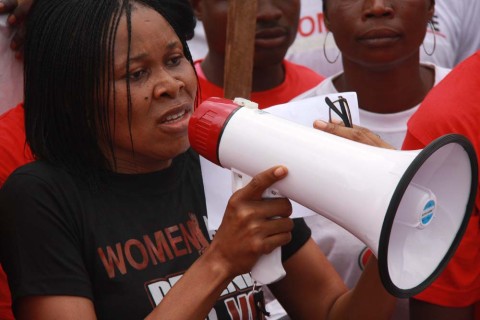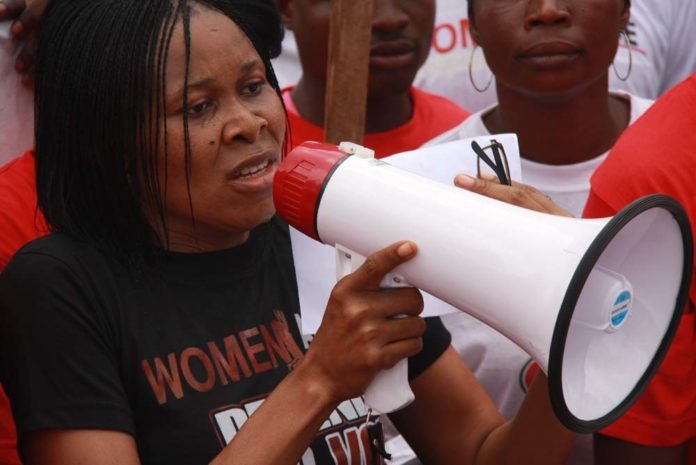
Thousands of women are gearing up for mass protest in Lagos, Port Harcourt, Benin and Abuja following Boko Haram’s massacre of school children and others in Yobe and other northern states.
The protest, dubbed ‘Mother of all Protests’ will see the women wearing black, which symbolises mourning, and they will march on the streets of Lagos, Abuja, Port Harcourt and Benin in a peaceful protest to call for an end to the endless gorry killings in the north.
The convener of the protests is the Women Arise Initiative, in conjuction with other women organisations.
Dr. Joe Okei-Odumakin, activist, social crusader and coordinator of the protests, said more women are indicating interest to join the protests and that before the protests kick off on Thursday, more states were likely to join.
“Women are having a peaceful walk to mourn all the killings happening in the Northern part of our country Nigeria, especially the recent slaughter of our kids in Yobe, Northern Nigeria. It is not enough to just be running commentaries on social media, or praying in our closets!
“Women and mothers are supposed to be the matrix of society, so we are calling on all women to a peaceful non-political, non-tribal and non-religious walk on Thursday, 6 March, 2014 in Lagos, Abuja, Port Harcourt, Benin and in the diaspora simultaneously.
“We want to mourn the wanton killing of our kids in Yobe and abduction of our young ladies up North and call on the government to wade in seriously before we lose more of our next generation,” she said.
Okei-Odumakin said women should be concerned about these mass killings going on in the North, East, West or South and that sanity must prevail in the nation.
In Lagos, she said the protest would kicked off at the Lagos Television Ground, Ikeja around 8:30 a.m., while the dress code is black T-shirt on black skirts/hijabs/trousers with black ribbons for the wrist.
“These brutal murders cannot be ignored. Activists should organise their women folk and join this walk. It is just a few hours of time but it will make a lasting impact,” she said.
Okei-Odumakin frowned at President Goodluck Jonathan’s nationwide broadcast on the centenary celebration a day after 59 children were killed in Yobe State, saying that it showed the president did not have conscience.
At least 74 more people were killed in attacks blamed on Boko Haram militants this weekend, taking the overall death toll this year beyond 300, with no apparent end in sight to the carnage.
Nearly 250 people had lost their lives since the turn of the year, even before the latest attacks, which saw twin blasts rip through the capital of Borno state, Maiduguri and heavily armed gunmen then opened fire on a nearby village.
The attacks will likely renew fears that Nigeria is struggling to contain the Islamist insurgency and the perception that militant fighters are able to roam the northeast with impunity, attacking at will.
At least 35 people were killed in the crowded Gomari district of Maiduguri, many of them food vendors and children hawking goods, as locals prepared for evening prayers on Saturday.
“We are still counting. So far we have counted 35 bodies. Our men are still working with rescue workers at the scene,” Borno State Police Commissioner, Lawal Tanko told AFP.
Witnesses said the final death toll could rise and as many as 50 people may have been killed and dozens of homes razed in the blasts.
Less than an hour later, gunmen dressed in military fatigues and armed with powerful assault rifles, rocket-propelled grenades and explosives laid siege to the village of Mainok 50 kilometres (30 miles) away, killing 39.
Separately, there were claims that 20 people were mistakenly killed in the village of Daglun, also in Borno state, during bombardment by airforce jets of suspected militants but the military denied the claim.
There was no immediate comment from Nigeria’s government, which has maintained that it is successfully tackling the violence, but French President Francois Hollande condemned the attacks “with the greatest possible rigour”.
Hollande visited Abuja last week and told his counterpart Goodluck Jonathan that Nigeria had France’s full support.
Borno and two other northeastern states, Yobe and Adamawa, have been under emergency rule since May last year and an increased military presence had pushed Boko Haram out of towns and cities into more remote, rural areas.
But Saturday’s blast in Maiduguri came after at least 43 people, most of them students, were killed as they slept when suspected Boko Haram gunmen burst into their secondary school dormitory.
At least 32 were killed in co-ordinated attacks in three separate locations on Wednesday in Adamawa state, including at a Christian theological college.
Borno state governor Kashim Shettima last month claimed that Nigeria’s military was outgunned by Boko Haram after an attack on a mostly Christian village on February 15 left 106 people dead.
The International Crisis Group said in its monthly “CrisisWatch” bulletin on conflicts around the world that the Boko Haram insurgency had deteriorated in February.
The attacks have also attracted concern from foreign governments to the United Nations, in particular because the majority of victims were civilians and schoolchildren.
There are increasing worries of a humanitarian crisis, as people in the three states flee their homes in fear.
The UN said last Thursday that a total of 290,002 people had been internally displaced in Adamawa, Borno and Yobe between the start of emergency rule and January 1 this year.
Nigeria’s military said on Sunday evening that it had killed a number of Boko Haram fighters, including those thought responsible for last week’s school attack in Yobe.
Defence ministry spokesman Chris Olukolade said an unspecified number of people had been arrested on suspicion of detonating Saturday’s bombs in Maiduguri.
But he said claims that civilians were killed in air operations against Boko Haram in Borno were untrue.
“The reports are believed to be part of the design by those bent on discrediting the counter-terrorist mission,” he added.
On Friday, the military claimed to have killed 13 suspected Islamists and arrested 15 others after a raid on a camp between Borno and Adamawa the previous day.
Boko Haram, which in the local Hausa language of the Muslim-majority north means “Western education is sin”, claims to be fighting to create a strict Islamic state in the mainly Muslim north.
The sect has since 2009 carried out attacks across the north and centre of the country but the violence has in recent months been concentrated in the northeast, the region where Boko Haram was founded more than a decade ago.







